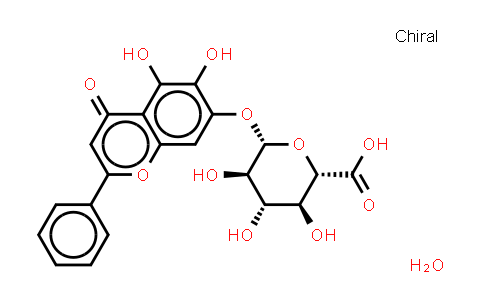
Baicalin NLT 98%
SKU : MC541415
CAS Number : 21967-41-9
Molecular Formula : C21H20O12 | Molecular Weight : 464.38
Synonyms : Baicalein 7-O-β-D-glucuronide
Quote Request| Purity | NLT 98% |
|---|---|
| Storage | at 20ºC 2 years |
* The above information is for reference only.
* If the product has intellectual property rights, a license granted is must or contact us.
| Chemical Name | Baicalin |
|---|---|
| CAS Number | 21967-41-9 |
| MDL Number | MFCD00149302 |
| Molecular Formula | C21H20O12 |
| Molecular Weight | 464.38 |
| Synonyms | Baicalein 7-O-β-D-glucuronide |
Baicalin is a flavonoid glycoside isolated from Scutellaria baicalensis. Baicalin reduces the expression of NF-κB. IC50 & Target: NF-κB[1] In Vitro: Baicalin protects against ischemia-reperfusion injury (IRI) by altering the production of various mediators, including reactive oxygen species (ROS), Toll-like receptor (TLR)2 and TLR4, NF-κB, Bax, and Bcl-2. Baicalin treatment inhibits the increased expression of the proinflammatory cytokines TLR2/4, MyD88, p-NF-κB, and p- IκB, as well as increase the expression of IκB protein, an NF-κB inhibitor, with the degree of inhibition positively related to the dosage of Baicalin[1]. Cell viability is determined by MTT assay. Compared with control cells, cell viability is significantly decreased in SH-SY5Y cells treated with thrombin. Pre-treatment with Baicalin (5, 10, 20 μM) increases cell viability in a dose-dependent manner compared with cells treated thrombin alone[2]. In Vivo: Baicalin pretreatment dose-dependently protects against a loss of renal function, with the two higher doses (10 and 100 mg/kg) significantly decreasing Scr and blood urea nitrogen (BUN) concentrations. Tissue injury, as assessed using a 0-3 point scoring system, is lower for the Baicalin treated groups than for the ischemia-reperfusion (IR)+saline group. Compared with the sham group, malondialdehyde (MDA) content is only slightly up-regulated and the SOD activity is only slightly down-regulated in rats treated with 10 and 100 mg/kg Baicalin, indicating that Baicalin abrogates the increase in oxidative stress following reperfusion[1].
Related Products
© Copyright 2015-2024 Hangzhou MolCore BioPharmatech Co.,Ltd. All rights reserved.
